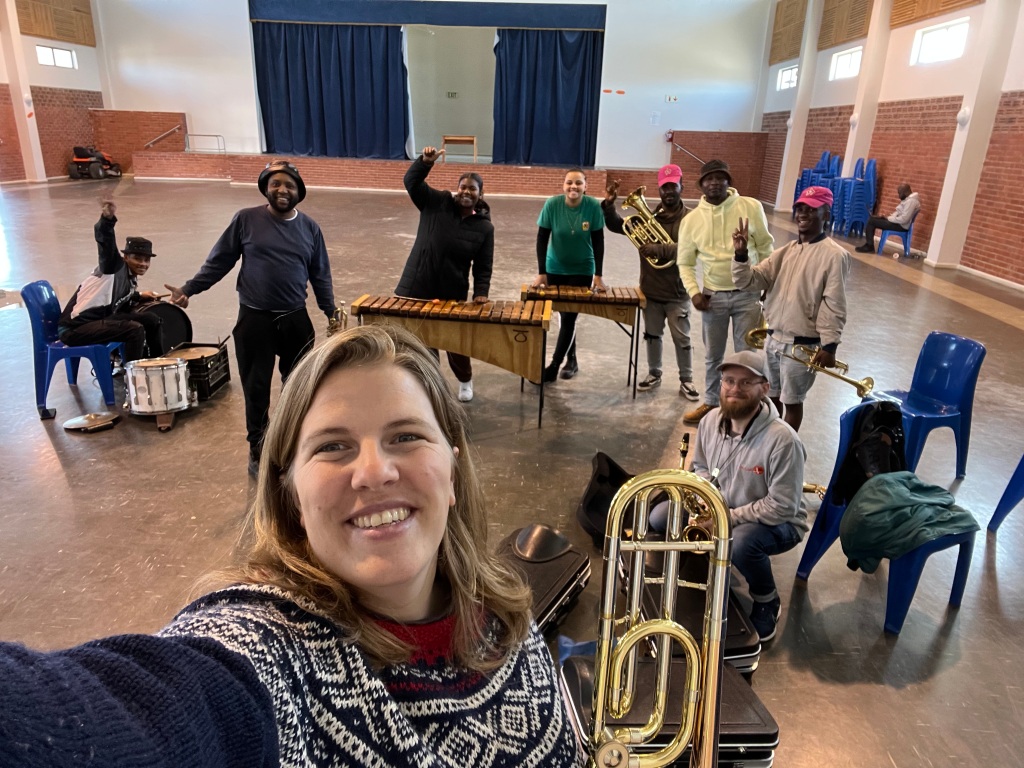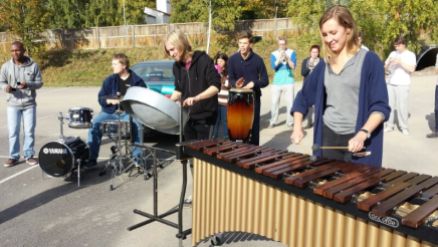How does different cultural and social contexts impact musical leadership styles? In this blog post, I explore the differences between South African field bands and Norwegian school bands. In addition, I try to understand how these differences affect the leadership of the bands.

I grew up learning to play the electric guitar in a very typical way for a kid born in the mid-1990s: I would explore different styles of music eagerly, and then search the internet for tutorial videos or tabulatures showing me how to play the amazing guitar riffs that I loved listening to. Whenever I couldn´t find any of these resources, I was left to begin the strenuous but rewarding process of transcribing the songs using only my ears.
As I grew up, I eventually attended a music program in high school. I was taught how to read sheet music and I was introduced to a whole new world of music. I was now playing jazz and even classical music on the guitar I bought with the sole purpose of rocking out. One might say that I was being introduced to the world where my school band-based classmates grew up.
However, when I travelled to South Africa 11 months ago to actually work with such bands, I once again had to dive into the world of «show and tell» music education. I could no longer rely on a score to communicate the music for me. If I wanted to teach music, I had to fully integrate the music in my heart and mind. In short, I had to rediscover the very same way of learning music that I started out with myself
Different context, different leadership
The partners of the PULSE project, Field Band Foundation (FBF) and the Norwegian Band Federation (NMF), works in two very differens social contexts. The FBF focuses on music that is taught efficiently, and emphasises life skills just as much as music. NMF introduces youth to the longstanding tradition of western orchestral music. Even though they work in different ways, both aim to help children experience self-mastery through music. My theory is that the difference lies in what self-mastery looks like in their communities.

Outside the rehearsal space the musicians of NMF are encountering an ever increasing social and academic pressure. The entry requirements to higher education have become ever more difficult the last couple of years, and different societal pressure is affecting even young children. I am not saying that South African youth doesn´t meet these challenges. But when the rehearsal space is surrounded by crime, drugs and unemployment, your parents telling you to do your homework might not be your primary concern in life.
And speaking of parents, they themselves illustrate an important observation I have made. I apologise for stereotyping, but these are the examples we often have in mind when looking at the parents as part of the banding ecosystem. We know that it does not illustrate the whole thruth, but it gives an insight into an important part of the truth.
In the NMF, banding parents are often highly engaged and a central part of the band leadership. They are board members and take pride showing up for fundraising activities.
The FBF parents, on the other hand, are not necessarily able to provide that same support. They might be working irregular hours and in many cases they do not have the emotional or economic capacity to support their children. Sometimes going to rehearsals even provide the members with a relief from their abusive parents or other guardians. Lastly, speaking of guardians, all of this is presuming that the parents are still around. As opposed to Norway, this is not always a given. They might have left their unplanned children in the hands of grandparents, they might have to move away to provide for their family, or they might have fallen victim to the societal ill of early death in South Africa.
The reason why I think it is important to recognize the state of the parent role, is because it reflects the necessity of leadership that the bands provide.

The Norwegian school bands has a distinct conductor who guides a neatly set up band through the daunting sheet music in front of them. The conductor is a musical mentor, helping the children to excel as musicians in much the same way that you might see in a professional symphony orchestra.
In the field band, the rehearsals look more like a school yard at recess — only that the favourite toys available are musical instruments. It is lively, loud and at times chaotic. But it is far from an unstructured mess. The band coordinator and tutors are carefully teaching the bamd members music with a highly efficient approach, combining «show and tell» and training the members ears. The social officer checks up on the members well-being, and serves as an important adult role model in their lives. On top of all this, the project officer oversees the rehearsal and makes all the administrative elements run smoothly.
Usually, the leadership even join in the playing themselves, as most of them once where members themselves. I often compare it to older siblings teaching their younger siblings a new game. They still enjoy the game, but they also provide mentorship and guidance. The tutoring combine a one-to-one teaching approach with a more collective approach of leading the whole section. In the Norwegian context, the one-to-one teaching is usually reserved for separate lessons at the local music school, which happen in addition to the band rehearsals.

I think the closer interaction between band members and leadership also stems from the fact that the leaders of the different field bands come from a similar social context as their members. They are not just some distant conductor with a master´s degree. They are often role models that the members can identify with. They are often less than 10 years older than the band members and have in many cases been members of the very same band they are now leading.
Not to say that the conductor of a Norwegian school band is not a role model, but they are a very different role model. They are musical experts, and they play an important role in inspiring a new generation of musicians. However, to a child who just want to play music with their friends, the conductor is probably not as relatable as a band coordinator or tutor that lives in the same street as you and who has experienced the very same reality that you are now coping with.
Learning to teach music differently.
As a somewhat serious Norwegian with a very nerdy relationship to music, I experience my role as a band leader very differently in South Africa. When I used to teach Norwegian ten year olds how to play guitar in a one-to-one lesson, I had the luxury of giving them my full attention and work on the nuances in their playing. As they improved, we could go on to more challenging pieces.
In the Field Band, I am surrounded by literal tons of young children (you can imagine how many units of children that adds up to). I have to come up with arrangements that are easily digestible while still being fun to play. For them, playing three chords with a cool groove is more importantly than to learn something that sounds impressive. Even the more advanced players will enjoy these simple arrangements. Rather than playing more complex parts, they experience growth through guiding their fellow band members. Don´t get me wrong: The senior members have great musical skills. However, in the rehearsal they often find themselves honing their teaching skills just as much as their instrumental chops.

The sibling-esque leadership of the FBF and the clear hierarchy of NMF express the needs of two different social contexts. Take these two personas for instance:
Thabo is a South African 11-year-old. He is living with an abusive grandmother and sometimes drink alcohol with his friends. Thabo might join the field band for the possibility to have fun for a couple of hours within a safe space in the rather unsafe world he is living in.
Lisa is a Norwegian 15-year-old. She has already decided that she wants to study medicine. She is also working at a café on the weekends to save up money so she can buy an appartement. Her motivation in the band might be to make her parents, who are board members in the band, proud by playing a complex arrangement.

Both are examples of youth having increased well-being and self mastery through musicking but in two completley different social contexts.
And naturally, the two musical contexts rely on two very different types of role models. Both band leaders might be competent and caring, but the difference lies in what quality is more important for them to succeed in their job. The Norwegian conductor can be a brilliant conductor, even if they are not the most sympathetic human in the world.
The South African tutor or band coordinator might not use «proper» musical figures when conducting or know how to read sheet music, but will succeed in their job as long as they manage to motivate and support the band members.

However, I find inspiration from both styles of leadership: The relationally strong band coordinator and the highly educated conductor. And I believe that we as music educators and role models should aspire towards mastering both leadership styles. Sadly, and especially in the western world, there is sometimes an overemphasis on mastering musical skills. Not only do I believe that being a motivating role model makes you a better leader for youth, but I think internalising music so deeply as if you were to teach each individual band member by ear can make you a better musician.
Understanding a score is useful, but there is an immense power in learning to free yourself from it. Over this last year I have learned just that, and I have noticed that my leadership abilities and musical confidence has increased. And all I really did was, oddly enough, to return to my musical roots. I returned to the raw passion of a teenager that wanted to learn music simply because he it sounds cool. Only now, I do it with the knowledge of somebody with a master’s degree in musicology. The way I see it, we can use the western method of theoretical score making in preparation for musical leadership. However, when it comes down to teaching music, we can all benefit from freeing ourselves from the theory and spend more energy connecting with the musicians making the music come alive. After all, music is first and foremost an auditory art form, not a visual one.
Written by Sondre Aksnes Yggeseth
Photos by Sondre Aksnes Yggeseth, Franqo Ntshole and Hanna Bakke Negård






























































Lovely write up Sondre!
Regards,
Ushama
[cid:image001.png@01D9B8AB.BB03B100]https://fieldband.org.za/